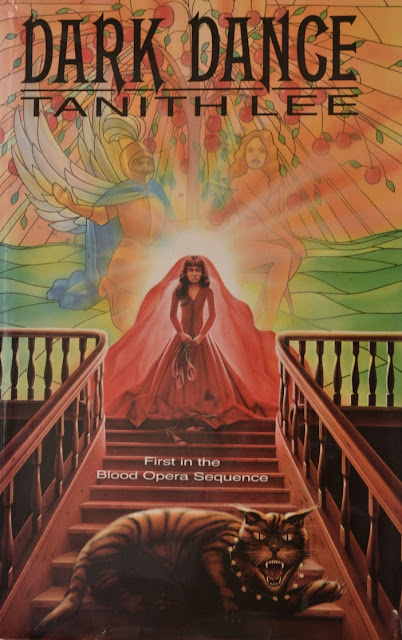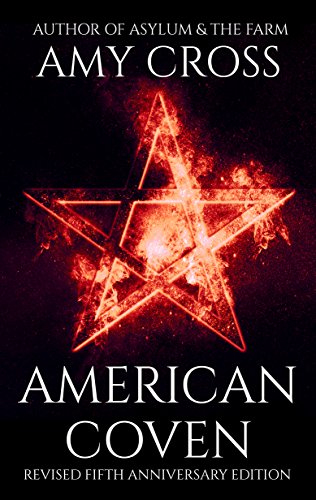 |
| Dark Dance (Bloof Opera I), by Tanith Lee, 1992, Macdonald & Co Cover Art: uncredited |
Tanith Lee has come up in a number of my Goodreads reading suggestions and on the back of these recommendations I decided to actually read something written by the author earlier this year.
I came across several of her titles, including Silver Metal Lover and Electric Forest, which all sounded appealing, but decided to make a start with Dark Dance, which is the first book in Lee's Blood Opera series.
As some of Lee's titles command quite a highish price tag on the second-hand book market, my decision to settle for Dark Dance was partially influenced by the availability of the hardback first edition for a reasonable price and, I have to admit, I liked the book's cover. (Sadly, the cover artist is not credited.)
Plot Summary - Dark Dance by Tanith Lee
Jumping straight into a summary of this book without giving too much away:
The story follows our heroine Rachaela Day from the point when she is plucked from her solitary and mundane life as a bookshop assistant in London to live with her father's family, the Scarabae, on the family's country estate, up to the point when her then 11-year-old daughter Ruth arrives to join the Scarabae family a decade later.
Having been brought up as an only child by her estranged and now deceased single-mother, Rachaela is at first reluctant to join her relatives. (She has thus far never met her father.) Yet, as circumstances appear to conspire against her, she eventually embarks on the journey to meet and live with this rather weird bunch of characters.
The Scarabae family is made up of a multitude of extremely long-lived oddballs, who idle away their days galloping through the house on toy horses or defiling books in the library before gathering at regular intervals for seagull stews and roast rabbit dinners. (The interaction between Rachaela and the Scarabae takes place almost exclusively during dinner time.)
Following a rather disconcerting nightly encounter with the most reclusive member of the family, Adamus Scarabae, Rachaela's father, the family's dark secrets (a tradition of intergenerational, incestuous relationships mixed-in with a moderate amount of vampire-like behaviours) are gradually unveiled to Rachaela and the reader.
Overwhelmed by the enormity of it all in combination with an unwillingness to yield to Scarabae family tradition and play her part in this 'familial arrangement', Rachaela makes a first attempt at returning into her old life, but due to abysmal public transport links (Tanith Lee delivers a humorous, yet totally factual, and thus damning indictment of the British public transport infrastructure in these passages) Rachaela is soon retrieved by her very own father, for whom she is, much to her own dismay and bewilderment, now harbouring sexual attraction.
Following their passionate encounter in the aftermath of Rachaela's 'repatriation' to the Scarabae family home, Adamus, however, reverts to his reclusive lifestyle within the tower. Ignored and neglected by her absent lover and bored-out by the remainder of the geriatric family members, Rachaela decides to embark on a second escape from the family, which ends in her return to London.
Here she intends to take-up her old lifestyle, but finds herself pregnant with Adamus's child. For the ensuing eleven years, we witness how Rachaela fits her life around her unwanted daughter, Ruth, until the family finally start stalking Ruth, who readily abandons her mother to take-up residence with the Scarabae.
In the aftermath of her daughter's departure from London, Rachaela follows Ruth to the estate. Motivated for the most part by jealousy of Ruth, who is now at the centre of the Scarabae's and, above all, Adamus's attention, and by a sense of maternal duty rather than genuine concern for her daughter's emotional wellbeing, Rachaela attempts to extract Ruth from the family's clutches, but has to resign herself to the role of a bystander, witnessing both Ruth's betrothal to Adamus and her eventual revolt against the family's rulebook.
Verdict
Dark Dance was quite something else and I am at a loss how to best assign this book to a genre, though I would agree that, purely for the sake of assigning a genre label to the story, I think Urban Dark Fantasy probably sums it up nicely. Perhaps even Urban Dark Erotic Vampire Fantasy? How does that sound?
Yes, there are vampires or vampiric elements, but this aspect of the story is not really touched upon in great detail and the reader is largely left in the dark about the specific nature of the Scarabae-type vampire. Some reviewers highlighted the erotic elements within the story. Yet, despite the explicit nature of a handful of passages, I wouldn't describe Dark Dance as Erotica or Erotic Fantasy either. The book is not exactly littered with descriptions of erotic scenes.
Yes, Dark Dance contains explicit references and descriptions of intergenerational incest. Some readers clearly are put off by this. Deal with it, or don't. It's the premise of the book. I repeat: Dark Dance is about incest as a longstanding tradition practised within the Scarabae family. The plot revolves around it, the family's peculiar characteristics and, above all, their longevity are derived (somehow) through the practice of incest. If you are put-off by references to and the description of incest, don't read Dark Dance. Your choice.
Yes, the storyelling remains at times rather vague, both in respect of the characterisation of the main protagonists, their motivations and their backstories. However, through this omission of backstory and lack of explanation Dark Dance derives its appeal (at least for me), i.e. through the elements of the plot, which are not touched upon. The unexplained adds to the appeal of the book.
As a deliberate stylistic choice, this ommission adds a layer of mystery and kept me guessing and pondering about the protagonists' choices and motivations long after finishing the book. Why, for example, is Adamus opting for a reclusive lifestyle away from the family, whilst at the same time complying with its traditions? What is the reason behind the persecution of the family, their residence in exile and how did they come to be what they are today in the first place? I am very much hoping that some of these aspects will be addressed in Personal Darkness, the second instalment of the Blood Opera series, which I shall definitely be getting hold of.
Lastly, I have to mention that I enjoyed Lee's style of writing immensely. It's evocative, atmospheric, sparse at times and not overly descriptive. She has an incredibly subtle sense of humour, which brilliantly came to life in her depiction of Rachaela's transport nightmare following her first escape from the estate, and she is extremely apt at conveying deadpan humour through dialogue. I will certainly be reading more by Tanith Lee.












